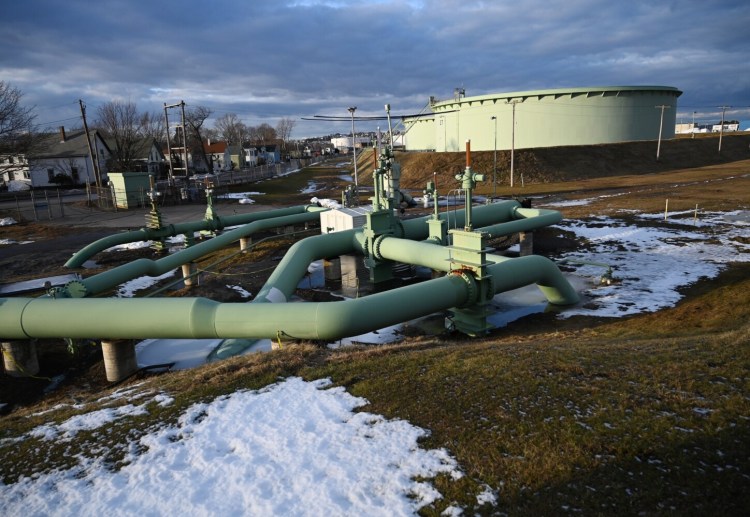SOUTH PORTLAND — The Biden administration has come out in support of the city’s 6-year fight to preserve local authority over air quality in a federal court battle with the Portland Pipe Line Corp.
Local officials and residents joined a national environmental group in praising a legal brief filed this week with the 1st U.S. Circuit Court of Appeals in Boston, saying it signals that the city’s fight could be nearing an end, and that other pipeline disputes could be handled in a similar fashion.
The amicus brief, filed by the U.S. Department of Justice on behalf of several agencies, asserts that federal law doesn’t preempt the city’s Clear Skies Ordinance, which effectively bans the pipeline company from exporting crude oil from Canada and loading it into tankers docked on the city’s waterfront.
Now mostly shut down, the 236-mile underground pipeline has carried more than 5 billion barrels of foreign crude from harbor terminals in South Portland to refineries in Montreal since World War II.
“We’re happy to see the Biden administration is supportive of our interpretation of the law and we’re allowed to regulate what is put into the air in South Portland,” Mayor Misha Pride said. “Federal law doesn’t supersede South Portland’s ordinance when it comes to enactment of the Clear Skies Ordinance.”
City Manager Scott Morelli said the court asked federal agencies to submit a brief on whether they believed the ordinance violated federal law. The submission was voluntary. Exactly when the court will take further action is unclear.
The pipeline company declined to comment on the administration’s support of the Clear Skies Ordinance.
Enacted by the City Council in 2014, the ordinance bans crude exports on the premise that loading so-called tar sands oil from western Canada into tankers here would pollute the city’s air. The pipeline is now owned by Suncor Energy Inc., the Canadian company that started the Great Canadian Oil Sands operation in 1967.
At the time the ordinance was approved, the company said it had no active plan to reverse the pipeline’s flow to bring crude oil from Canada to South Portland. The city’s planning board had approved a proposal to reverse the flow in 2009, and it extended the approval through 2012. But the company never started the project, and by 2013 it was assuring the public it had no active plan transport Canadian crude to Maine.
The company filed its lawsuit in February 2015 in U.S. District Court in Portland and has pushed it through several levels of court review – a process that has cost the city more than $2.6 million, including $175,000 covered by private donations.
In subsequent years, the pipeline and its 23 massive light green storage tanks have become largely dormant as demand for foreign crude in Canada has dwindled.
The Clear Skies Ordinance’s stated goals are to protect public health and the environment, preserve traditional land use authority and promote future development consistent with the city’s comprehensive plan.
The pipeline company, however, contends that the ordinance is preempted by state and federal law, violates the Commerce Clause of the Constitution, and adversely impacts national and international oil trade. The constitutional clause gives Congress the power to regulate interstate and foreign trade.
In its 38-page brief filed Monday, the Biden administration explains how the ordinance doesn’t violate the Commerce Clause and isn’t preempted by the federal Pipeline Safety Act or the federal government’s constitutional powers to oversee foreign affairs. Representatives of the U.S. Department of State, Department of Transportation and Coast Guard were among the officials who signed onto the brief.
Local activists also welcomed the Biden administration’s support.
“Yahoo!! This is potentially a huge deal for everyone who has worked so hard and so long on this issue – locally and nationally!” said a Facebook message posted by Roberta Zuckerman, a leader of Protect South Portland.
The National Wildlife Federation said the brief signals that the Biden administration may not block other local authorities battling oil pipelines with local laws.
“The Biden administration underscored that federal law does not override a state or locality’s decision about where an oil pipeline should be located,” the federation said in a written statement.
The federation said the court filing also suggests that Michigan Gov. Gretchen Whitmer’s efforts to shut down an Enbridge Inc. pipeline in the Great Lakes region are not subject to federal preemption. Proponents of Line 5 say Whitmer doesn’t have the power to revoke an easement the company needs to build a tunnel under the Straits of Mackinac.
South Portland’s mayor agreed that a resolution of the lawsuit in the city’s favor could benefit others who are fighting for local control over pipeline operations.
“We’ve been fighting this fight for more than six years,” Pride said. “This moves us one step closer to a resolution of the lawsuit and the possibility that it could be precedent-setting for other pipeline disputes.”
Send questions/comments to the editors.



Comments are no longer available on this story